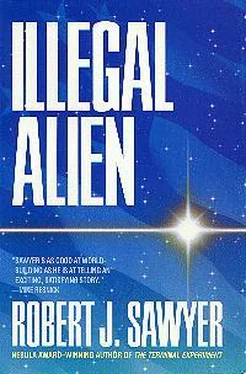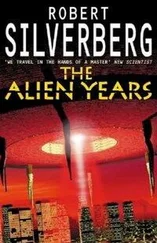“Amazing,” said Dale. “And the others all think you’re dead?”
“They do,” said Seltar. “And we must keep it that way.”
“Why?”
“I am your only hope.”
“To clear Hask, you mean?”
Her tuft split in the now familiar Tosok shrug. “Your language lacks sufficient pronouns. I am your only hope. I am the only hope of you.”
“Pardon?”
Hask stepped forward. “As Cletus might have put it, ‘I am the only hope of y’all.’ She means she is the last hope of the human race.”
“What?” Frank felt his eyebrows climbing.
“The things we shall tell you must remain secret,” said Seltar. “You cannot divulge them to anyone without my permission.”
“We promise not to say anything,” said Dale.
Hask turned to Seltar. “He is speaking the truth.”
“Then tell them,” said Seltar.
Hask turned back to the humans. “Seltar and I belong to what you might call a different religion than the other six Tosoks, although perhaps a different philosophical school would be a better description.” He looked at Frank, then at Dale. “The crossbreeding that is the norm among Tosoks—four males and one female involved in most unions—has led to a substantial degree of interrelation among the Tosok people. The result is that we tend to think of the survival of our race as more important than the survival of any one individual. The school Seltar and I belong to abjures that; we have seen the damage it can do. That is why we are mating exclusively with each other.”
“I don’t understand,” said Frank. “Surely such interrelation would have all kinds of benefits. I bet you have fewer wars than we do.”
“We in fact have no wars,” said Hask. “I was amazed to learn of the human propensity for them. But on the question of interrelation, as in all questions, one side always has more power, and in this one, the negative aspects of protecting the species at all costs are greater than the benefit.”
He paused, as if thinking about how to express himself. “Dale, during this case we encountered at least one juror who would say and do anything to get accepted, presumably in order to ensure a particular outcome. Well, Seltar and I did everything we could to get appointed to one of the star missions.” His two front eyes blinked. “The tragedy is that several missions did get away without any of us among the crew.”
Dale sounded confused. “What are you talking about?”
“What do you think the purpose of the Tosok expedition to your solar system is?” asked Hask.
“Exploration, no?” said Dale. “To see what was here?”
“No. The purpose of the mission was survival—survival of the Tosok race.”
Frank nodded, his worst fears confirmed. “So you did come to invade Earth.”
“Invade?” Hask’s tuft waved backward. “No. We certainly would not want to live here. Your sun is so bright and large, your air smells, and all those annoying insects! No, no, the Tosoks are quite content with our home.”
“Then what did you mean by saying your mission is survival?”
“We come from a world currently orbiting Alpha Centauri A at a distance much greater than your world orbits your sun. In fact, we orbit so far out from Centauri A that we are just on the outermost edge of orbital stability—any farther out, and the gravitational effects of Centauri B would be significant.”
“So your planet is at risk,” said Frank.
“At risk? No, not at all.”
“Then what’s the problem?”
“There is a third star in our system—Centauri C. Centauri C orbits the center of mass of the A-B system in a hugely eccentric path. Approximately every four hundred thousand Earth years it passes very close to us. When it last approached us, Centauri A was positioned between Centauri C and the center of mass of the A-B system; when it next approaches us, Centauri B will be between C and the center of mass. Indeed, since the orbital period of C is a precise multiple of the A-B orbital period, there is a perfect alternation: on one pass, A will be between C and the center of mass; on the next pass, B will be between C and the center of mass, and so on.”
“So?” said Frank.
“So mass curves space, of course, and at each near passage of C, that curvature becomes sufficient that my home world slips from orbiting around A to orbiting around B, or vice versa. We call this transfer ‘the handoff.’ Of course, there is a period of instability during the handoff. Still, when orbiting A, we ultimately settle in at a comfortably warm two AUs or so from that star. But when orbiting B, although we also settle into an orbit not much greater than two AUs from B, things are much colder, for B is a much fainter star. Our climate is temperate when we orbit A, but when we orbit B, our surface temperature drops to”—he paused, and worked controls on his pocket computer—“almost fifty degrees below zero Celsius.”
“My God!” said Frank. “That’s below the freezing point for carbon dioxide. It must kill everything.”
“It does not. Those lifeforms that have persisted on our world have developed a natural ability to hibernate during these times. Everything simply pauses for four hundred thousand years, until Proxima swings by again, causing a reverse handoff, bringing us back into orbit around Alpha Centauri A. Temperatures rise, the long sleep ends, and we continue on.”
“That’s incredible,” said Dale. “I mean, wouldn’t it require enormous luck for a world to exist in a stable configuration like that?”
“Incredible? No. Unlikely perhaps, but, then again, no more unlikely than the coincidences of sizes and orbits that makes possible the kind of perfect total solar eclipse we observed from Earth’s surface. Of all the inhabited planets in the entire universe, Earth may be the only one that enjoys such a spectacle.”
“I suppose,” said Dale, “but—”
“And, of course, there usually are such harmonics to orbital mechanics. Orbits of bodies around each other are often in perfect ratios: two-to-three, one-to-two, and so on. Your innermost planet, Mercury, for instance, revolves round your sun exactly two times for every three times that Mercury rotates around its own axis; its day is precisely two-thirds the length of its year.” Hask’s tuft split in the center. “No, our configuration may be as unique as the perfectly eclipsing combination of your Earth, your giant moon, and your sun, but it is possible, and although it may not always have been this way, nor may it always be this way, it has indeed been stable for millions of years.”
“Doesn’t the handoff cause a lot of earthquakes?” asked Dale.
“The Tosok home world has no moon,” said Hask. “It probably did once, or else our world would have an even greater greenhouse effect than it does now; Clete told me that without the moon, Earth’s atmosphere would resemble Venus’s—a thick blanket covering the world. Our old moon’s gravity doubtless skimmed off some of our original atmosphere, but that moon must have been lost during one of the handoffs. Anyway, without your own moon churning up Earth’s interior through its tidal effects, you would not have any plate tectonics; Earth is, after all, unique among the planets in your solar system in having such things. Without crustal plates, you do not get earthquakes; they are unknown on our world. Except for the impact on our climate, the handoffs proceed quite smoothly.”
“But if handoffs occur only every four hundred thousand years,” said Frank, “your race can’t have known one yet. I mean, you guys are advanced beyond us, but by hundreds of years, not by hundreds of centuries.”
“True,” said Hask. He paused. “Our fossil record is scantier in many ways than is yours. But since we have no plate tectonics, no portion of our crust is ever subducted and destroyed through the passage of time; although there are fewer fossils, our record is contiguous in a way that yours is not. We were astounded when our geologists found proof in core samples of the huge periodic temperature changes our world had undergone for at least many tens of millions of your years. But although the fossil record shows that a few species die out at each great freezing, most simply continue on immediately after the thaw. Life on our world has evolved to deal with the handoffs—or, more precisely, only those lifeforms that had an ability to survive freezing survived the first handoff, and all current lifeforms are descended from them.” He paused. “Perhaps it is not coincidental that our hearts are primitive compared to yours; I understand many earthly fish and amphibians—creatures with similar hearts—can also survive periods of freezing.”
Читать дальше











